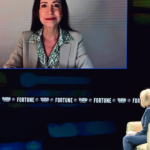In my strategy class this spring, a student leaned back during a discussion about automation and quipped, “Well, we aren’t going to get a job anyway because of AI, so who cares?” Laughter rippled across the room. It was quick, light—even comforting. But beneath the jokes lay a tense reality. This feeling is the elephant in the room for many young people: they sense the job market evolving under AI’s influence, and they’re not sure where they’ll fit.
When I asked several students if they ever talk seriously about AI replacing jobs, one replied, “Not really. If you think about it too much, it feels hopeless.” Another said, “We just figure something else will come along. Or maybe we’ll figure out how to work with it.” Humor has become a coping tool—a way to acknowledge the threat without dwelling on it.
Some students are already hedging: gravitating toward fields that seem more human-centric—mental health, skilled trades, education—and others are diving into AI skills, hoping to stay ahead. A few are building side gigs early: freelancing, tutoring, and part-time creative work. One student captured it best: “If AI really changes everything, we can’t control it. So I’d rather focus on what I can do now.” It’s a blend of pragmatism and fatalism that feels uniquely Gen Z.
But the risk is that humor can mask passivity. Laughing off the threat may ease the moment but doesn’t set up long-term preparedness. These same laughs surface in TikToks about job interview awkwardness, tales of the “Gen Z stare” in service roles, and viral “workplace hacks” like CC-ing fake lawyers to protect oneself from bad bosses—shared because they make real work anxieties feel relatable.
The challenge is for educators, employers, and policymakers to build on Gen Z’s humor, adaptability, and intelligence—not shy away from it. Laughter is part of their cultural toolkit, a way to defuse tension and build connection, but it should be paired with clear-eyed preparation. Laughing through uncertainty isn’t inherently harmful; in fact, it can signal resilience. Yet if humor becomes the only response, it risks leaving deeper concerns unaddressed.
Helping this generation see beyond the joke means showing them how to translate quick wit into strategic thinking. That might involve embedding AI literacy into every discipline, encouraging students to treat emerging tools as collaborators rather than threats, or designing workplace mentorship programs that help young employees connect short-term problem-solving with long-term career planning. It also means rewarding adaptability not just when things go wrong, but when it’s used proactively to anticipate change.
AI will reshape work in unexpected ways, touching industries from creative arts to healthcare logistics. It may introduce entirely new career categories, while making others obsolete faster than any previous wave of automation. The real question is whether Gen Z’s combination of humor, adaptability, and caution will help them ride that wave—or whether they will find themselves reacting too late, caught in its undertow. For now, the laughter continues. The work ahead lies in making sure it is paired with the skills and foresight to turn uncertainty into opportunity.
The opinions expressed in Fortune.com commentary pieces are solely the views of their authors and do not necessarily reflect the opinions and beliefs of Fortune.









